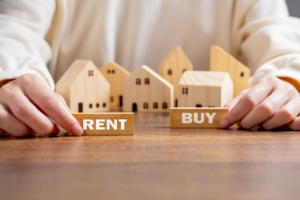The Perennial Debate – Which is Better: Buying or Renting?
June 21, 2024
To Inform:

Deciding whether to buy or rent is a question that seems to have no definite answer, depending on who you ask. If you ask any existing homeowner, nine times out of ten, the answer is “Buy! It builds equity.” If you ask anyone in their 20’s or early 30’s they might respond with, “Rent! My roommates and I save money each month because our rent is split 6 different ways.” Neither of these answers are wrong, but the right answer is about finding the best fit for your lifestyle. When thinking about buying or renting, ask yourself: What are the market conditions? What is my current financial situation? What are my long-term goals? These are all the factors that should help you decide which is the best fit for you.
What are the market conditions? There is a lot of pressure to make the right choice between buying and renting. It’s a big financial decision that is influenced by market conditions. A few key conditions include purchase price, cost to rent a similar property, length of time you plan to live there, mortgage interest rates, and down payment percentage. An easy way to keep track of these factors and see the correlation between them is by using a buy vs. rent calculator. The New York Times has a great financial calculator that allows you to analyze how these factors affect your personal situation.
What is my current financial situation? There are big differences when it comes to the initial cost between buying and renting. When it comes to buying a house, a few key considerations include: a down payment, closing costs, and moving expenses. This means you may need to save a significant amount of money before buying a house. For rentals there’s less upfront cost including a security deposit and often the first and last month’s rent. Renting becomes a great option for younger people just starting their careers and who may have just started saving money. The monthly cost for renting is significantly lower than the monthly cost associated with buying a house which includes mortgage payments, property taxes, insurance, and maintenance. Renting also allows you more flexibility to save from month to month and prepare for your future goals.
What are my long-term goals? Depending on where you see yourself in the next couple of years will help you decide between flexibility vs. building equity. Renting provides flexibility for people who might find themselves moving frequently. The amount of time you stay in one place can help you determine when to build equity. If you buy a house, you should plan on staying a minimum of five years, so if you sell your home there will be enough equity to cover closing costs. Time isn’t the only commitment to consider; saving long-term is also important. If you are in a position to increase your savings while also paying a mortgage, you might choose to build equity with a home purchase.
The option to buy or rent is different for every individual and there is no one right or wrong choice. Considering your lifestyle needs, your own financial situation, long-term goals, and being aware of market conditions will help you choose the best option.

Written by Jane Gum, Summer Intern